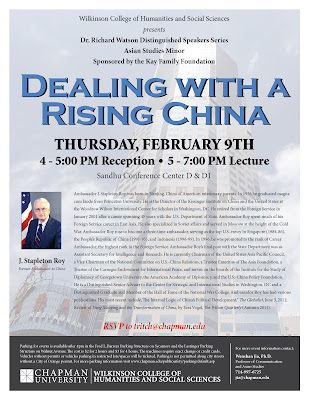Wilkinson College of Humanities and Social Sciences presents, "Dealing with a Rising China" with former ambassador of China, J. Stapleton Roy, Thursday, February 9 at 4PM. This lecture is part of the Dr. Richard Watson Distinguished Speaker Series sponsored by the Kay Family Foundation.
Ambassador J. Stapleton Roy was born in Nanjing, China of American missionary parents. In 1956 he graduated magna cum laude from Princeton University. He is the Director of the Kissinger Institute on China and the United States at the Woodrow Wilson International Center for Scholars in Washington, DC. He retired from the Foreign Service in January 2001 after a career spanning 45 years with the U.S. Department of State. Ambassador Roy spent much of his Foreign Service career in East Asia. He also specialized in Soviet affairs and served in Moscow at the height of the Cold War. Ambassador Roy rose to become a three-time ambassador, serving as the top U.S. envoy in Singapore (1984-86), the People’s Republic of China (1991-95), and Indonesia (1996-99). In 1996, he was promoted to the rank of Career Ambassador, the highest rank in the Foreign Service. Ambassador Roy’s final post with the State Department was asAssistant Secretary for Intelligence and Research. He is currently Chairman of the United States Asia Pacific Council, a Vice Chairman of the National Committee on U.S.-China Relations, a Trustee Emeritus of The Asia Foundation, a Trustee of the Carnegie Endowment for International Peace, and serves on the boards of the Institute for the Study of Diplomacy of Georgetown University, the American Academy of Diplomacy, and the U.S.-China Policy Foundation. He is a Distinguished Senior Adviser to the Center for Strategic and International Studies in Washington, DC and a Distinguished Graduate and Member of the Hall of Fame of the National War College. Ambassador Roy has had various publications. His most recent include, The Internal Logic of China’s Political Development,” The Globalist, June 3, 2011; Review of Deng Xiaoping and the Transformation of China, by Ezra Vogel, The Wilson Quarterly (Autumn 2011).
To RSVP for the event, please contact Allison Tritch via-email at tritch@chapman.edu.
Ambassador J. Stapleton Roy was born in Nanjing, China of American missionary parents. In 1956 he graduated magna cum laude from Princeton University. He is the Director of the Kissinger Institute on China and the United States at the Woodrow Wilson International Center for Scholars in Washington, DC. He retired from the Foreign Service in January 2001 after a career spanning 45 years with the U.S. Department of State. Ambassador Roy spent much of his Foreign Service career in East Asia. He also specialized in Soviet affairs and served in Moscow at the height of the Cold War. Ambassador Roy rose to become a three-time ambassador, serving as the top U.S. envoy in Singapore (1984-86), the People’s Republic of China (1991-95), and Indonesia (1996-99). In 1996, he was promoted to the rank of Career Ambassador, the highest rank in the Foreign Service. Ambassador Roy’s final post with the State Department was asAssistant Secretary for Intelligence and Research. He is currently Chairman of the United States Asia Pacific Council, a Vice Chairman of the National Committee on U.S.-China Relations, a Trustee Emeritus of The Asia Foundation, a Trustee of the Carnegie Endowment for International Peace, and serves on the boards of the Institute for the Study of Diplomacy of Georgetown University, the American Academy of Diplomacy, and the U.S.-China Policy Foundation. He is a Distinguished Senior Adviser to the Center for Strategic and International Studies in Washington, DC and a Distinguished Graduate and Member of the Hall of Fame of the National War College. Ambassador Roy has had various publications. His most recent include, The Internal Logic of China’s Political Development,” The Globalist, June 3, 2011; Review of Deng Xiaoping and the Transformation of China, by Ezra Vogel, The Wilson Quarterly (Autumn 2011).
To RSVP for the event, please contact Allison Tritch via-email at tritch@chapman.edu.

No comments:
Post a Comment